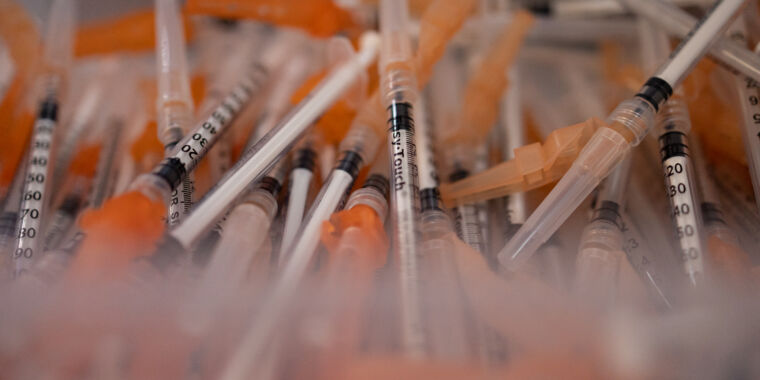German man got 217 COVID shots over 29 months—here’s how it went
It conflicts with concerns of repeat boosters, but authors warn against hypervaccination.
A 62-year-old man in Germany decided to get 217 COVID-19 vaccinations over the course of 29 months —for "private reasons." But, somewhat surprisingly, he doesn't seem to have suffered any ill effects from the excessive immunization, particularly weaker immune responses, according to a newly published case study in The Lancet Infectious Diseases.
The case is just one person, of course, so the findings can't be extrapolated to the general population. But, they conflict with a widely held concern among researchers that such overexposure to vaccination could lead to weaker immune responses. Some experts have raised this concern in discussions over how frequently people should get COVID-19 booster doses.
In cases of chronic exposure to a disease-causing germ, "there is an indication that certain types of immune cells, known as T-cells, then become fatigued, leading to them releasing fewer pro-inflammatory messenger substances," according to co-lead study author Kilian Schober from the Institute of Microbiology – Clinical Microbiology, Immunology and Hygiene. This, along with other effects, can lead to "immune tolerance" that leads to weaker responses that are less effective at fighting off a pathogen, Schober explained in a news release.
My guess is that his t-cells are fine because he's had constant antibodies so the t-cells haven't had to mop up anything, and also it's not a live virus. If you are living life like it's pre-covid times, you're most certainly being constantly exposed to covid anyway.
If you aren't over 65, or immunocompromised, and you find a way to get two vaccines a year, you'll probably be fine. People doing this have had mixed results in regards to how the 1-per year recommendation is being enforced and the CDC official covid advice is now "fuck it, do whatever, yolo", so why not?
If you got an MRNA in the fall, maybe try novavax for less side effects and a slightly different spectrum of protection.



The official line is that they are not needed except for high risk groups because b and t-cell immunity should be sufficient after antibodies wane. Generally, for most people, antibodies peak after about three to four months, and are mostly gone after 6 months. If your antibodies are gone and you get infected, you will be relying on b and t-cells and rolling the dice on how quickly they react to the virus once it's in the bloodstream. After a year you aren't really protected much at all, because covid is rapidly mutating, but the immune system is complex and people react differently, so there are a bunch of factors which effect everything, like if you were exposed to covid throughout the year, and how much of it you were exposed to, and when, and which mutations, and how different those mutations are from what your immune system is prepared for, and how your immune system responded to all of that.
But, yes, if you want covid antibodies year round, you'd want a booster or new vax every six months.
considering how captured the centers for disease circulation is, i'm guessing the real numbers are twice a year for most people and 3-4 if you're at-risk